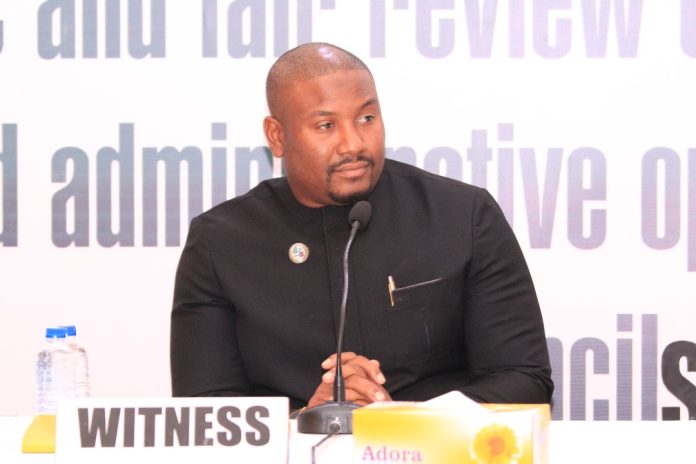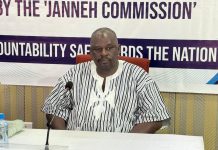By Yankuba Jallow
The Local Government Commission of Inquiry on Monday, 8 September 2025, pressed Mayor Talib Ahmed Bensouda of the Kanifing Municipal Council (KMC) on a wide range of issues, including his financial dealings with contractors, procurement during the COVID-19 pandemic, questionable road rehabilitation payments, and missing vouchers from the council’s accounts.
The session was led by Lead Counsel Patrick Gomez, who asked questions on behalf of the Commission, as the inquiry continued its probe into the financial and administrative activities of local government councils between May 2018 and January 2023.
The questioning first turned to KMC contractor Alu Kora.
“We have the issue of one of the suppliers of Kansu. It’s a contractor, Alieu Kora. You know Alu Kora?” Gomez asked.
“Yes, I know Alieu,” Bensouda said.
“Do you have any personal relationship with Alu Kora?”
“I know him through day-to-day at the Kansu.”
“Now, Alieu Kora, we have seen you have a financial deal with Alieu Kora.”
“In what sense?”
“He said it’s an issue of loan.”
“Okay, yes. He gave a statement.”
“Do you recall this?”
“I recall, yes.”
“Can you please give us a background of that?”
“I believe he had a contract with the Ministry of Agriculture, according to him. And he was struggling to fulfill the requirements of the contract. So he was begging for support or he would lose the contract. So I gave him a short-term loan.”
“How much was it?”
“About half a million.”
“That’s it?”
“Yes. Yes.”
Gomez pressed further: “Do you think it’s usual to have a financial relationship with a supplier, a regular supplier of council, or a contractor who has on several occasions benefited financially from council? Do you think it is normal that there would not be any conflict when you have this financial relationship with a supplier who benefits significantly from council’s funds through contracts awarded?”
“I don’t have any financial relationship with Alieu. It’s a one-time support. I do support many people, not just him. It was a one-time request that I helped him with,” Bensouda said.
The Commission then confronted him with evidence that “there were payments made to Mr. Kora that he even did not, or was not awarded contracts. For instance, there were payments that were intended to be paid to a company called Tender Enterprise, and Mr. Kora happened to be the recipient of those funds as well. I’m not sure whether you are aware of this.”
“I’m not aware of that,” Bensouda responded.
The inquiry also looked into his financial ties with another associate. “We have another issue regarding financial relationship, we think, between you and Mr. Dean, Julian Adams,” Gomez said.
“Yes,” the mayor acknowledged.
“Mr. Dean was questioned on this, and he stated that you issued him some financial support. Do you recall this?”
“Yes.”
“Can you please guide us through what happened?”
“In late 2022, Nuru lost his father. He wanted to procure land in, I believe, Busumbala, and that he wanted to build. But he told me he was expecting money that had not yet arrived and was desperate. So, in support of him, I loaned him D2 million. Early 2023, I believe he paid D1 million, and the rest he paid in installments.”
The Commission noted that Mr. Dean’s testimony described the loan as linked to a car-dealing business, to which Bensouda said: “So when he was asking for the money it was in relation to land. He told me he was expecting some income but during the commission that’s when I learned that he was engaged in petty petty business or whatever business he was doing.”
The questioning then shifted to the COVID-19 relief program. Documents were produced showing a council resolution for the procurement of 3,000 bags of rice during the 2020 state of emergency. D1 million was resolved by the finance committee for the procurement of the 25kg rice.
“Do you recall this?” Gomez asked.
“I recall it, yes.”
“Now, this was discussed in Council.”
“Yes, it was.”
“And do you know whether the full procurement process in relation to this procurement?”
“No, I think I’ve heard about it afterwards, but not during the time. And I think you said 300. I think you made a guess. It’s 3,000.”
“Yes, 3,000,” Gomez corrected.
“So, we had, it was coronavirus time. The Councillors and myself, we wanted to intervene to support the community. So, we decided to cancel our remaining travel budget because it was useless. We could not travel anyway. Most countries have travel restrictions. So, we had a goal of, I believe, 10,000 bags of rice, 3,000 in which we said we would purchase from the travel budget. Yes. And 7,000, I would look for donations. I believe we came close to 10,000. We got, I think, maybe 6,000 in donations.”
The Commission noted that the rice was purchased from Shyben A. Madi and asked why procurement rules were not followed.
“So, if I remember correctly, it was Council’s decision to make sure it was purchased. I think it was agreed that we should bypass in the discussions. That we should bypass because of the time sensitivity. I think it was an error of panic. So, we said it’s an emergency and must be purchased,” Bensouda said.
The hearing later examined payments for road rehabilitation works, focusing on requests and vouchers that were allegedly reused multiple times. One was ŕaised by councillor Baboucar Mansally for a road rehabilitation project. The voucher was dated 13 May 2020. The requester, Mannsally, said the gravel that was used for the 2019 road rehabilitation was not suitable and was muddy. Gomez said the same request was photocopied and payments were made using the same request. Gomez mentioned three instances in which the same request was photocopied and payment was made. D381,720 was the amount requested. Mayor Bensouda was given the documents to see. After this, he said “Yes.”
“So, you have noticed that it is the same request that is used throughout,” Gomez said. “Four times.”
“Four times” Bensouda said.
“This was not brought to my notice. This, the first complaint that I saw, because he copied me. That’s why I said CEO forward for your attention. So, I knew of this complaint, and I went to the road, and he’s right. When I got there, the initial works was not good, because the area was all muddy. If you step on it, your foot would sink. Yes. So, when he wrote this request, copied me, so I CEO forward for your attention. But how it is done this way, it seems they are trying to dodge the threshold for GPPA.”
“Yes, exactly,” Gomez replied.
The Commission also read from a statement by Councillor Babacar Mansally who denied signing later requests, saying: “The signatures on the other three request forms are as per voucher 200694, 201627, and 201005 are not mine.” He added that “monies that were withdrawn and allegedly paid were perhaps, they appeared to be fraudulent as far as his denial is concerned.” Mansally said council never rehabilitated the roads after the first time. He added that no subsequent work was done after thee first one.
Bensouda said the CEO was Sainabou Martin-Sonko and the finance director was doctor Alieu Keita.
Further scrutiny was directed at the KMC Environmental Transformation Program (KEP) funded through an EU grant, focusing on financial statements, Euro and Dalasi accounts, and changes to signatory mandates at Ecobank.
“There’s two accounts,” Bensouda explained. “There is the Euro account and the Dalasi account. And from my understanding, the Euro account is just the CEO and the director of finance, which is council’s account. That’s where they should receive all the grant money. The operational account is the project account. That’s where they implement the project, which is under the director of the project, but the CEO is still a co-signatory to that account to monitor the project.” Bensouda was requested to bring the account statements and the audits on the accounts.
The Commission highlighted that under the Local Government Finance and Audit Act 2004, only the CEO and director of finance are recognized as signatories. Transfers, however, were effected by the deputy CEO and finance manager.
“So when we see that it appears to be contrary to the Finance and Audit Act 2004 … it appears to be improper or contrary to the finance and account finance local government finance and audit account run for,” Gomez said.
“Yes so like I said it was the project there’s a project office and then there’s the council. The way the project is structured it may seem contrary to the Finance and Audit Act but it’s the way the project was structured through the EU,” Bensouda responded.
The session concluded with questions on missing vouchers, where system-generated figures showed D9.8 million while auditors cited D7.6 million, and the Commission could only verify D5 million.
“So which means what is in the system and what has been checked upon are two different things,” Gomez said.
“I agree. So the system is not matured so that’s why the Ministry of Finance wanted everybody to move on the IFMIS. We are using FINEX. So the FINEX system is not up to standard according to the Ministry. So which means Kanifing Municipal Council is using both manual and the FINEX. And the FINEX. So the system generated vouchers are usually done manually, the implementation,” Bensouda admitted.
“But do you agree that this has created some serious problems in reconciling the accounts of council?” Gomez pressed.
“It’s a big problem. I think the biggest challenge is the proper software is expensive. It’s a big investment but when government said they want to do the integrated management system I think they even started paying some of the officers to be trained but it’s not yet,” Bensouda replied.
The Commission ended the day’s session noting it would revisit some of the unresolved financial discrepancies.
“We have no other questions for today. The other issues will be dealt with tomorrow,” Gomez said.



















